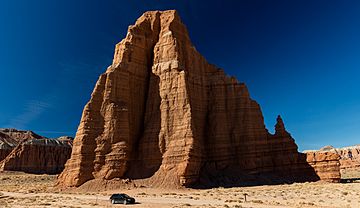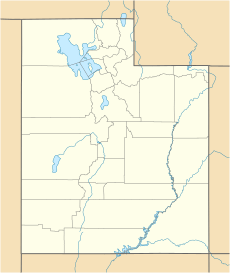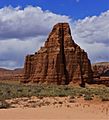Temple of the Moon (Utah) facts for kids
Quick facts for kids Temple of the Moon |
|
|---|---|

Temple of the Moon, east aspect
|
|
| Highest point | |
| Elevation | 5,665 ft (1,727 m) |
| Prominence | 285 ft (87 m) |
| Isolation | 0.37 mi (0.60 km) |
| Parent peak | Temple of the Sun (5,822 ft) |
| Geography | |
| Location | Capitol Reef National Park Wayne County, Utah, US |
| Parent range | Colorado Plateau |
| Topo map | USGS Fruita NW |
| Geology | |
| Age of rock | Jurassic |
| Type of rock | Entrada Sandstone |
| Climbing | |
| Easiest route | closed to climbing |
Temple of the Moon is a tall rock formation in Capitol Reef National Park, Utah, USA. It stands 5,665 feet (1,727 meters) high. This amazing rock is a monolith, which means it's a single, huge stone block.
It's located about 12 miles (19 km) north of the park's visitor center. You can find it in an area called Cathedral Valley. This valley got its name in 1945 from Charles Kelly. He was the first superintendent of Capitol Reef National Monument. The valley's sandstone rocks reminded early explorers of grand, old cathedrals. These cathedrals have fancy walls, arches, and tall spires. Temple of the Moon itself rises almost 300 feet (90 meters) from the ground around it.
How Temple of the Moon Formed
Temple of the Moon is made of a type of rock called Entrada Sandstone. This sandstone is a buff-pink color and is very strong. Scientists believe this rock formed about 160 million years ago. This was during the Jurassic period, when dinosaurs roamed the Earth.
The sandstone started as sandy mud on a flat area near the ocean. Over millions of years, it became part of a huge sand sea. This was the biggest sand sea in Earth's history! The rock layers in Cathedral Valley look almost flat. They only tilt slightly to the east.
Much later, the entire Colorado Plateau slowly lifted up. This lifting kept the rock layers mostly flat. However, Capitol Reef is special because of the Waterpocket Fold. This is a giant bend in the rock layers. It formed between 50 and 70 million years ago.
Amazing Views of Temple of the Moon
Weather in the Area
The best times to visit Temple of the Moon are in spring and fall. The area has a Cold semi-arid climate. This means winters are cold, with average temperatures below 32°F (0°C). Most of the rain and snow falls in spring and summer.
This desert area gets less than 10 inches (254 mm) of rain each year. Snowfall in winter is usually light.
| Climate data for Capitol Reef Visitor Center, elevation 5,653 ft (1,723 m), 1981-2010 normals, extremes 1981-2019 | |||||||||||||
|---|---|---|---|---|---|---|---|---|---|---|---|---|---|
| Month | Jan | Feb | Mar | Apr | May | Jun | Jul | Aug | Sep | Oct | Nov | Dec | Year |
| Record high °F (°C) | 58.6 (14.8) |
68.3 (20.2) |
78.3 (25.7) |
84.4 (29.1) |
94.6 (34.8) |
100.2 (37.9) |
100.8 (38.2) |
97.9 (36.6) |
95.4 (35.2) |
86.1 (30.1) |
70.4 (21.3) |
61.5 (16.4) |
100.8 (38.2) |
| Mean daily maximum °F (°C) | 40.6 (4.8) |
46.4 (8.0) |
54.7 (12.6) |
65.0 (18.3) |
74.5 (23.6) |
85.3 (29.6) |
90.4 (32.4) |
87.9 (31.1) |
80.2 (26.8) |
66.1 (18.9) |
51.3 (10.7) |
40.6 (4.8) |
65.3 (18.5) |
| Mean daily minimum °F (°C) | 17.8 (−7.9) |
22.7 (−5.2) |
30.2 (−1.0) |
36.2 (2.3) |
44.7 (7.1) |
53.1 (11.7) |
60.4 (15.8) |
58.5 (14.7) |
50.4 (10.2) |
39.0 (3.9) |
27.6 (−2.4) |
18.2 (−7.7) |
38.3 (3.5) |
| Record low °F (°C) | −4.2 (−20.1) |
−11.8 (−24.3) |
9.1 (−12.7) |
18.1 (−7.7) |
27.2 (−2.7) |
34.6 (1.4) |
42.4 (5.8) |
45.1 (7.3) |
29.9 (−1.2) |
11.7 (−11.3) |
8.0 (−13.3) |
−7.5 (−21.9) |
−11.8 (−24.3) |
| Average precipitation inches (mm) | 0.52 (13) |
0.34 (8.6) |
0.53 (13) |
0.47 (12) |
0.59 (15) |
0.47 (12) |
0.91 (23) |
1.20 (30) |
0.80 (20) |
0.98 (25) |
0.49 (12) |
0.32 (8.1) |
7.62 (194) |
| Average dew point °F (°C) | 17.3 (−8.2) |
20.8 (−6.2) |
23.0 (−5.0) |
24.5 (−4.2) |
29.1 (−1.6) |
32.0 (0.0) |
40.0 (4.4) |
41.8 (5.4) |
34.8 (1.6) |
28.2 (−2.1) |
21.9 (−5.6) |
17.5 (−8.1) |
27.6 (−2.4) |
| Source: PRISM | |||||||||||||
 | Delilah Pierce |
 | Gordon Parks |
 | Augusta Savage |
 | Charles Ethan Porter |









